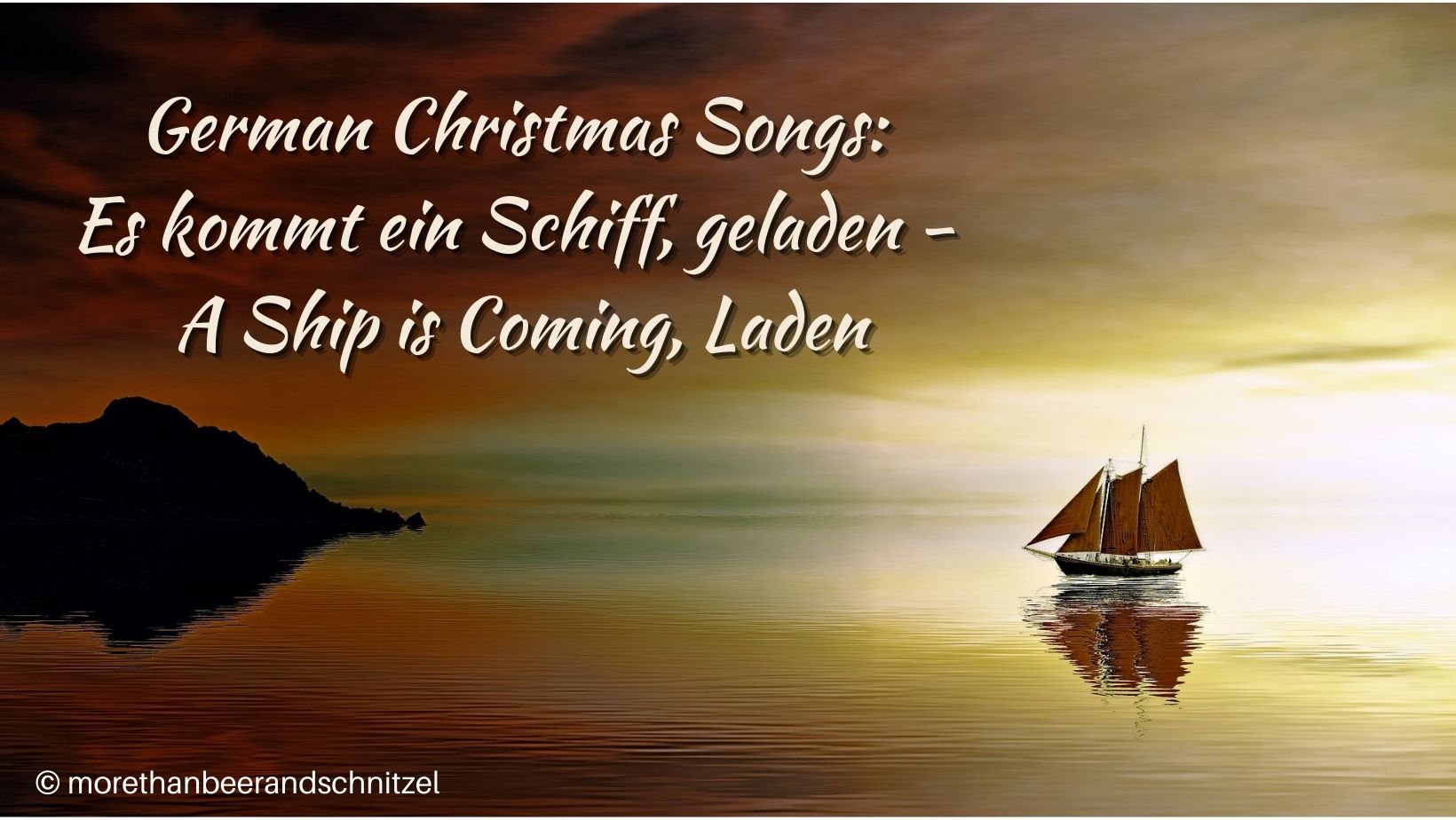With the hymn Es kommt ein Schiff geladen, (A ship is coming, laden) we are going even further back in time than with the two Christmas songs I talked about earlier, Stille Nacht, heilige Nacht (1818) and Ihr Kinderlein, kommet (1808/10).
It is the third song in my YouTube Playlist though obviously you can shuffle all songs.
The melody to this song dates back to the first half of the 15th century and originated probably in the Alsace. We find it for the first time in the Andernacher Gesangsbuch (Andernach hymnbook) of 1608. But we don’t know who wrote it.
The text as we know it today consists of three different parts from different authors and years.
The mystic Johannes Tauler is often credited with the first three stanzas, however it is not clear that he is indeed the author. The text to this so-called Marienlied (Marian hymn) was found in a manuscript of 1450 in the women’s cloister St. Nikolaus in Straßburg. Johannes Tauler was a frequent visitor to the monastery but he died in 1361. One of his students possibly wrote down the song or copied it from an earlier text that hasn’t survived.

The second part, stanzas 4-6, of the song was written by the Protestant Daniel Sudermann for the Straßburger Gesangbuch, published in 1626. His stanzas include the motifs of Bethlehem and the manger to make the symbolism of Mary as the ship more understandable.
Sudermann also rewrote some parts of the first stanzas to make them more comprehensible, he even names the song with the following long title: Ein uraltes Gesang, so unter deß Herrn Tauleri Schrifften funden, etwas verständlicher gemacht: Im Thon, Es wolt ein Jäger jagen wol in des Himmels Thron (A very old song, found in Mr Tauler’s writings, made a little more comprehensible: in sound, A hunter wanted to hunt, the throne of heaven).
Here he references Johannes Tauler which is why many assumed Tauler wrote the original hymn. The last part of the title (A hunter wanted to hunt) probably refers to the melody of a song with that name.
The last verse wasn’t added until the turn of the 20th century by Catholics when the hymn became part of church services again and was included in hymn books. Sometimes the last stanza is part of the song, sometimes it is not.
The rendition of Es kommt ein Schiff, geladen by the Chor Norddeutschland (Chorus Northern Germany) includes stanza 1, 2, and 4.
Lyrics in German and English
Es kommt ein Schiff, geladen
bis an sein’ höchsten Bord,
trägt Gottes Sohn voll Gnaden,
des Vaters ewig’s Wort.
Das Schiff geht still im Triebe,
es trägt ein’ teure Last;
das Segel ist die Liebe,
der Heilig’ Geist der Mast.
Der Anker haft’ auf Erden,
da ist das Schiff am Land.
Das Wort tut Fleisch uns werden,
der Sohn ist uns gesandt.
Zu Bethlehem geboren
im Stall ein Kindelein,
gibt sich für uns verloren;
gelobet muß es sein.
Und wer dies Kind mit Freuden
umfangen, küssen will,
muß vorher mit ihm leiden
groß’ Pein und Marter viel,
danach mit ihm auch sterben
und geistlich aufersteh’n,
ewig’s Leben zu erben,
wie an ihm ist gescheh’n.
Maria, Gottes Mutter,
gelobet musst du sein.
Jesus ist unser Bruder,
das liebe Kindelein.
There comes a galley, laden
Up to the highest board;
She bears a heav’nly burthen,
The Father’s eterne Word.
She saileth on in silence,
Her freight of value vast:
With Charity for mailsail,
And Holy Ghost for mast.
The ship has dropt her anchor,
Is safely come to land;
The Word eterne, in likeness
Of man, on earth doth stand.
At Bethlem in a stable,
To save the world forlorn
(O bless Him for His mercy),
Our Saviour Christ is born.
And whosoe’er with gladness
Would kiss him and adore,
Must first endure with Jesus
Great pain and anguish sore.
Must die with Him moreover,
And rise in flesh again,
To win that life eternal,
Which doth to Christ pertain.
From: The Cowley Carol Book for Christmas, Easter, and Ascensiontide, 1901. Carol #31
UniSono Paderborn sings the an older version of the first two verses, and then the third stanza is the last or seventh one of the text above.
Uns kommt ein Schiff gefahren,
es bringt uns süße Last,
darauf viel Engelscharen,
und hat ein hohen Mast.
Das Schiff kommt uns geladen,
Gott Vater hat’s gesandt.
Es bringt uns hohe Gnaden,
Christ – unsern Heiland.
Maria, Gottes Mutter,
gelobet musst du sein.
Jesus ist unser Bruder,
das liebe Kindelein.
Literal Translation (by me)
There is a ship coming for us,
it’s bringing us a sweet load;
On it many hosts of angels,
And (it) has a tall mast.
The ship is coming to us laden,
God the Father has sent it.
It brings us high mercies / grace,
Christ – our Savior.
Mary, mother of God,
you must be praised;
Jesus is our brother,
the dear little child.



Only registered users can comment.
Comments are closed.